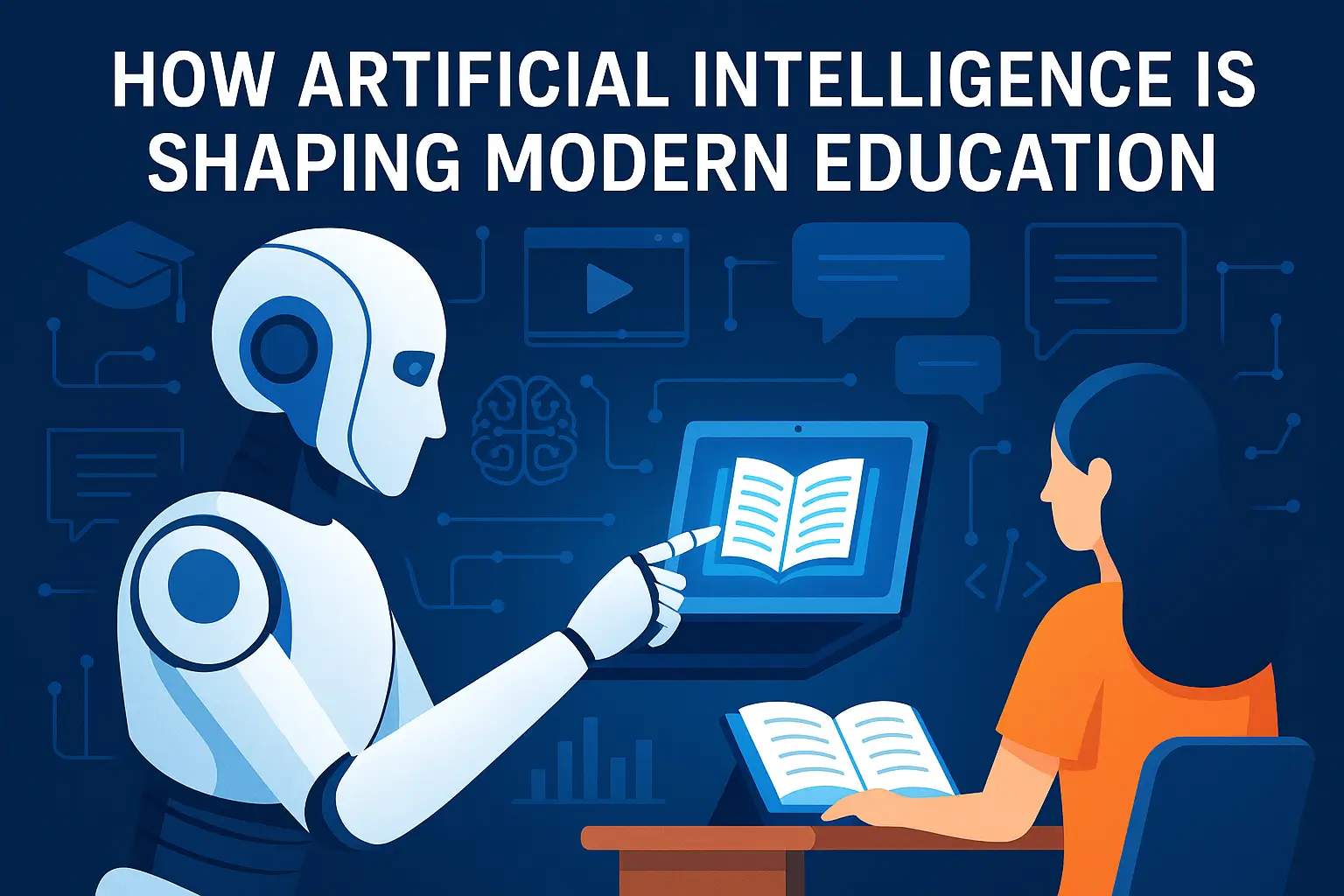Education is one of the most vital sectors in society, and it’s currently undergoing a profound transformation driven by Artificial Intelligence (AI). From personalized learning to administrative automation and smart tutoring systems, AI is reshaping how students learn and how educators teach. In this article, we’ll explore the growing influence of AI in modern education and the possibilities it offers for the future of learning.
Why AI Matters in Education
AI offers solutions to some of the most persistent challenges in education:
- Personalizing learning experiences at scale
- Automating time-consuming administrative tasks
- Supporting students with special needs
- Enhancing teacher effectiveness
- Expanding access to quality education worldwide
With AI, education becomes more adaptive, inclusive, and efficient.
Personalized Learning Experiences
Every student learns differently. AI enables personalized learning by analyzing student behavior, preferences, and performance data to:
- Recommend tailored content and learning paths
- Adjust the pace of instruction based on progress
- Identify learning gaps and offer targeted remediation
- Motivate students with real-time feedback and gamified experiences
Platforms like Khan Academy, Coursera, and Duolingo use AI to adapt their content and help students stay engaged.
Intelligent Tutoring Systems
AI-powered tutoring systems simulate one-on-one instruction by:
- Guiding students through problems step-by-step
- Providing hints and explanations based on individual needs
- Tracking progress and adjusting the difficulty level
- Offering encouragement and corrective feedback
These systems help bridge the gap when human tutors aren’t available, especially in underserved communities.
Automated Grading and Assessment
Grading is time-consuming and often inconsistent. AI can streamline this process by:
- Grading multiple-choice and short-answer questions instantly
- Analyzing essays using natural language processing (NLP)
- Providing detailed feedback on grammar, coherence, and argument strength
- Monitoring student submissions for plagiarism
This frees up teachers to focus more on instruction and student engagement.
Virtual Classrooms and AI Teaching Assistants
In online education environments, AI enhances the virtual classroom experience by:
- Hosting AI-powered chatbots to answer student questions in real time
- Offering translation and transcription for global learners
- Monitoring participation and flagging disengaged students
- Supporting asynchronous learning with personalized video summaries
These features create a more interactive and supportive learning environment.
AI in Special Education
AI supports students with learning disabilities and other challenges through:
- Speech recognition tools for students with dyslexia
- Predictive text and communication aids for students with autism
- Personalized learning plans based on cognitive profiles
- Visual and auditory feedback for enhanced comprehension
By adapting content delivery, AI makes education more accessible and equitable.
Curriculum Development and Teacher Support
AI helps educators by:
- Recommending curriculum updates based on new standards and student needs
- Creating quizzes, lesson plans, and learning materials
- Analyzing student data to identify at-risk learners
- Offering professional development resources and training suggestions
These tools reduce teacher workload and enhance instructional quality.
Educational Data Analytics
AI processes vast amounts of educational data to generate insights for:
- Tracking student progress over time
- Predicting dropout risks and academic success
- Evaluating the effectiveness of teaching methods
- Informing policy and funding decisions
Administrators and policymakers use these insights to make data-driven improvements.
Language Learning and Translation
AI enables effective language learning through:
- Real-time translation of course materials and communication
- Speech-to-text and pronunciation analysis tools
- Adaptive vocabulary and grammar lessons
- Conversation simulations with virtual AI partners
These tools help students become fluent faster and connect across cultures.
Benefits of AI in Education
1. Individualized Learning
AI delivers customized instruction that meets students where they are.
2. Improved Outcomes
With targeted support and real-time feedback, students achieve better results.
3. Increased Efficiency
Teachers spend less time on grading and administration and more on teaching.
4. Greater Access
AI-powered platforms make quality education available to students in remote or underserved areas.
5. Scalability
AI enables educational solutions to reach millions of learners globally without compromising quality.
Challenges and Ethical Considerations
Despite its benefits, the use of AI in education raises important questions:
1. Data Privacy
AI systems collect and analyze sensitive student data. Protecting this information is essential for trust and compliance.
2. Algorithmic Bias
If AI models are trained on biased data, they may reinforce inequalities or stereotypes.
3. Over-Reliance on Technology
Too much automation can diminish the human connection and critical thinking in education.
4. Equity of Access
Not all students have the same access to devices and internet connectivity, risking a new digital divide.
5. Teacher Adaptation
Educators need training and support to integrate AI tools effectively into their practice.
Future Trends: AI and the Evolution of Learning
As AI continues to advance, we can expect:
- Emotion AI to detect student frustration and adapt responses
- AI learning companions that mentor students throughout their academic journey
- Immersive virtual and augmented reality classrooms
- Blockchain-based credentialing for transparent, portable academic records
- Global collaboration platforms powered by real-time translation and AI moderation
These innovations promise to make education more engaging, inclusive, and responsive to the needs of the 21st century.
Final Thoughts: Smarter Education for a Smarter Generation
Artificial Intelligence is not here to replace educators—it’s here to empower them. By enhancing personalization, streamlining tasks, and expanding access, AI is helping build an education system that prepares learners for a rapidly changing world.
As schools and institutions embrace these tools, the future of education looks brighter, more adaptive, and more connected than ever before.
